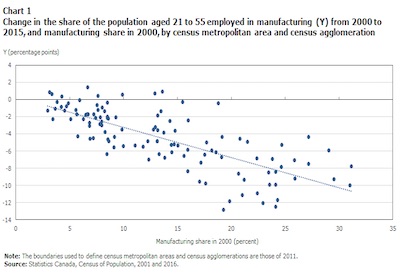The Impact of the Manufacturing Decline on Local Labour Markets in Canada

Jan 22, 2020
By René Morissette
This study quantifies the impact of the manufacturing decline on the wages and employment rates of Canadian workers in their local labour markets. The estimates, drawn from census data from 2000 to 2015, indicate that the decline in manufacturing employment had a sizable adverse effect on the wages and full-year, full-time employment rates of men — especially less educated men. In contrast, relatively few groups of women appear to have been negatively affected by the decline in manufacturing employment. The results also suggest that two-thirds or more of the decline in full-year, full-time employment rates among men observed from 2000 to 2015 in census metropolitan areas such as Montréal, Ottawa–Gatineau, Windsor, Oshawa, Toronto, Hamilton, St. Catharines–Niagara, Kitchener–Cambridge–Waterloo and Guelph can be attributed to the manufacturing decline.
From the early 2000s to the mid-2010s, the number of employees in manufacturing fell by roughly half a million in Canada. During that period, the percentage of Canadian men aged 21 to 55 employed mainly full time for at least 48 weeks in a given year fell by 5 percentage points, from 63.6% in 2000 to 58.6% in 2015. This study investigates whether the two trends are connected, i.e., whether the decline in manufacturing employment caused a decline in employment rates and wages among men.
This question is important for a variety of reasons. First, manufacturing used to be a major source of employment for less educated men. The disappearance of manufacturing jobs might therefore decrease employment opportunities for these workers. Second, many manufacturing jobs paid higher-than-average wages. As these jobs disappear, the external options for less educated individuals fall for both those who formerly held jobs in manufacturing and others. This reduces the individual bargaining power of these workers when negotiating wages. Third, through input-output linkages, the manufacturing decline may reduce labour demand in other industries, putting additional downward pressure on the wages of some workers in local labour markets. For these reasons, the manufacturing decline might reduce the wages and employment rates of less educated individuals.
Using census data from 2000 to 2015, the study finds that, on average, a 5 percentage point decline in the share of the population employed in manufacturing in a given census metropolitan area (CMA) or census agglomeration led to a 4.5 percentage point decline in full-year, full-time employment rates among men and at least a 6.9% decline in their real weekly wages. Estimated wage effects are more substantial for less educated men than for men with a bachelor’s degree or higher education. In contrast, the results indicate that relatively few groups of women appear to have been adversely affected by the decline in manufacturing employment.
The results also suggest that two-thirds or more of the decline in full-year, full-time employment rates among men observed from 2000 to 2015 in CMAs such as Montréal, Ottawa–Gatineau, Windsor, Oshawa, Toronto, Hamilton, St. Catharines–Niagara, Kitchener–Cambridge–Waterloo and Guelph can be attributed to the manufacturing decline.
René Morissette is a senior researcher with Statistics Canada and has vast experience using microdatasets for investigating a wide variety of socio-economic issues. Solid experience teaching economics and statistics, both in Canada and abroad.











